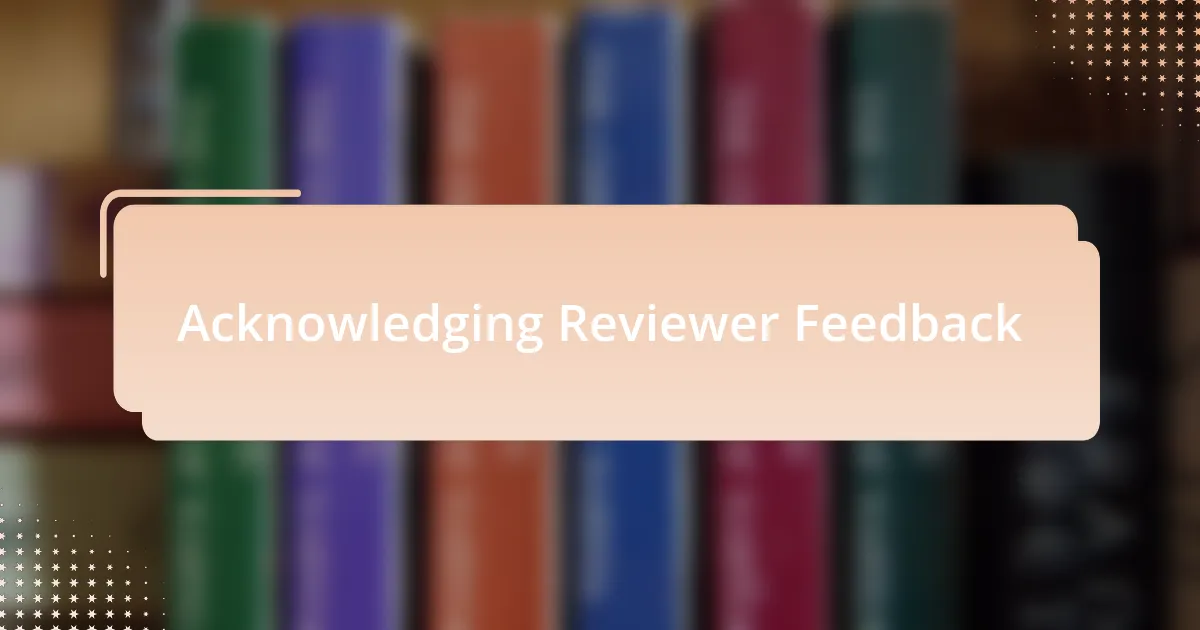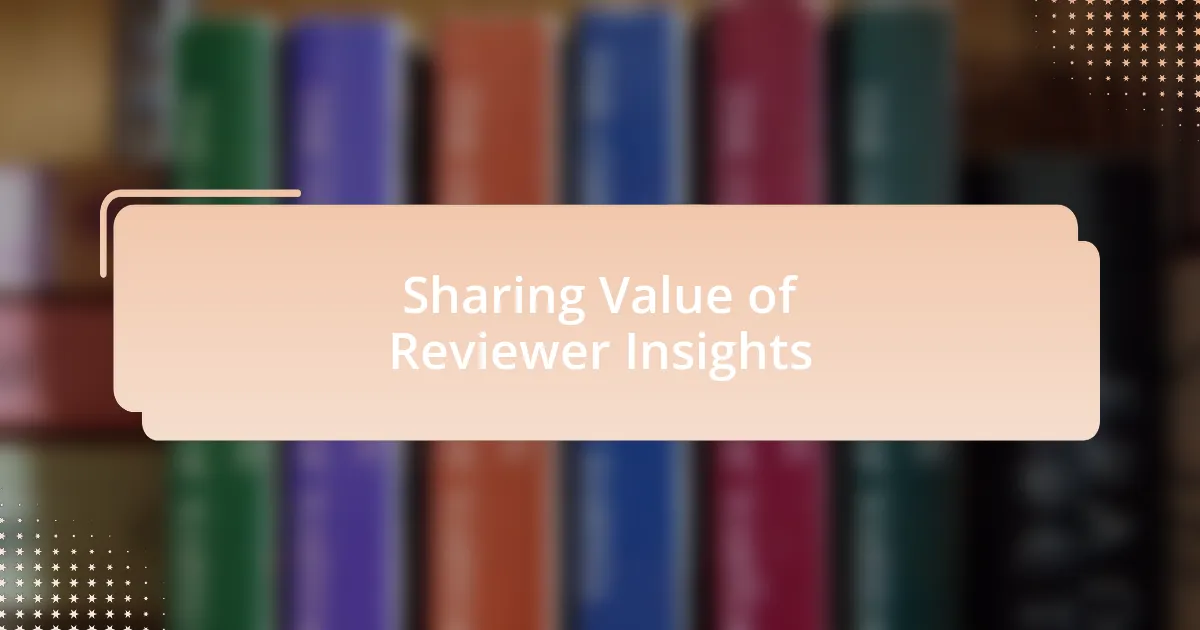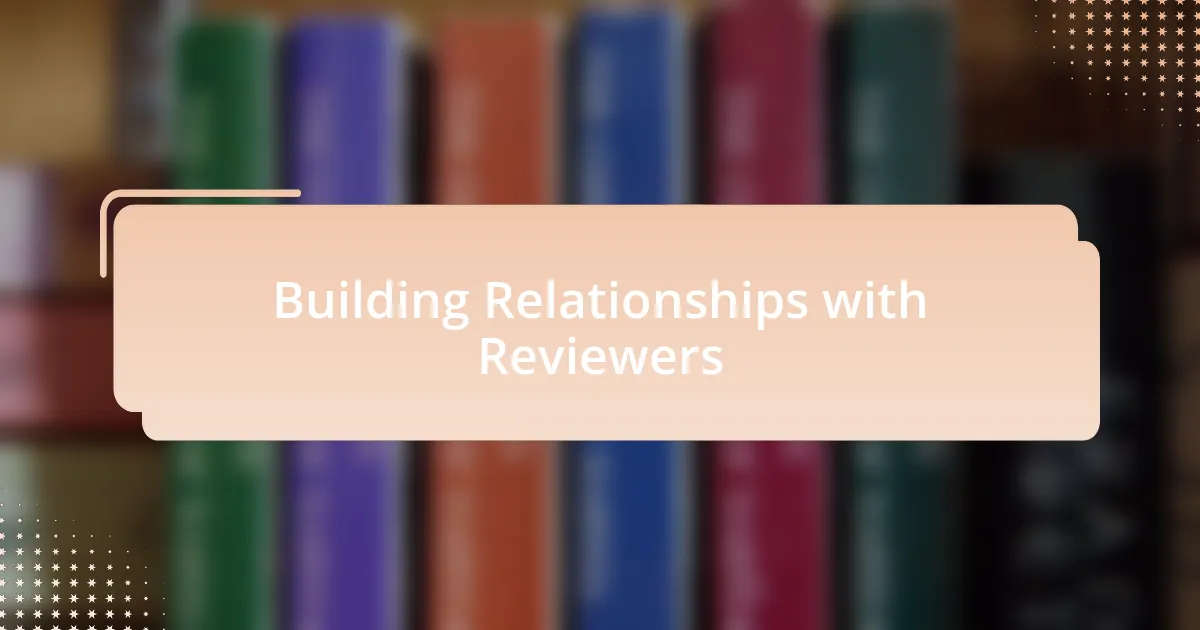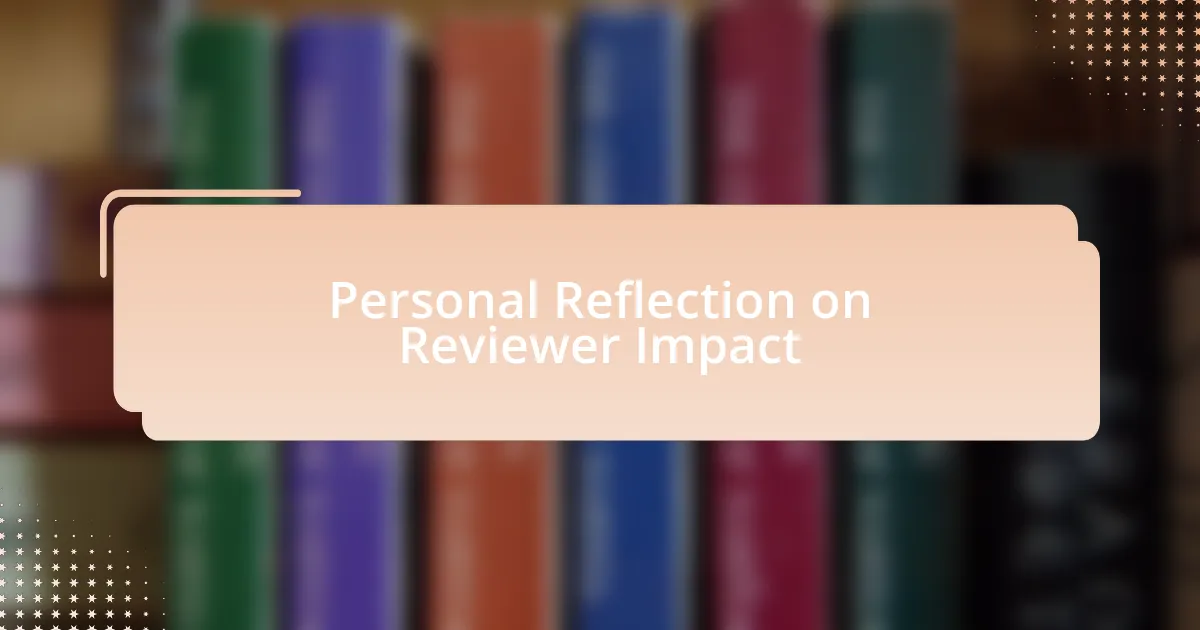Key takeaways:
- The peer review process is essential for maintaining research quality, with critiques enhancing scholarly work through constructive feedback.
- Acknowledging reviewer feedback fosters collaboration and helps authors refine their arguments and expand their research scope.
- Sharing insights from reviewers can elevate the entire academic community by identifying common issues and promoting a standard of excellence.
- Building relationships with reviewers can lead to ongoing dialogue and collaborative opportunities, enhancing the research experience.

Understanding Peer Review Process
The peer review process is a fundamental pillar of academic publishing, ensuring that research meets the rigorous standards of quality and integrity. I remember my first experience as a reviewer; it was both thrilling and nerve-wracking. I felt a responsibility not just to the authors but also to the readers who rely on credible research to inform their understanding.
During the review, I often grappled with questions like, “Is the methodology sound?” and “Does this piece contribute something valuable to the field?” These questions drove me to dive deeper into the research and think critically about its implications. The emotional weight of being a part of this process can be overwhelming, but it’s also rewarding to help elevate the quality of scholarly work.
Understanding the peer review process also involves recognizing the complexities of reviewer feedback. Each critique is a dialogue, a chance for authors to refine their arguments and clarify their findings. I’ve learned that even the toughest feedback, while difficult to hear, often leads to stronger, more robust publications. Isn’t it fascinating how collaboration, even through criticism, can ultimately enrich the academic discourse?

Acknowledging Reviewer Feedback
Acknowledging reviewer feedback is crucial for enhancing the quality of our work. I recall a time when I received critical comments from a reviewer that struck a nerve. Initially, I felt defensive, as if my work was being judged unfairly. However, upon reflection, it became clear that those insights prompted me to reevaluate my arguments and sharpen my analysis. This experience taught me that embracing feedback can transform a rough draft into a polished piece of scholarship.
I often find myself thinking about the complexity behind reviewer comments. It’s easy to dismiss criticism as mere dissatisfaction, but each piece of feedback is an opportunity for growth. There was a particular instance when a reviewer pointed out gaps in my literature review. Their perspective forced me to expand my research scope, ultimately broadening my understanding of the topic. Have you had a similar experience where criticism turned into a catalyst for improvement?
In the academic world, acknowledging the value of reviewer feedback is not just polite; it’s essential. It opens up a pathway for collaboration, fostering a rich exchange of ideas. I’ve learned to approach reviewer insights with curiosity, as they remind me that I’m not just a solitary author but part of a larger scholarly community working together to advance knowledge. How can we all foster this spirit of collaboration and gratitude in our academic pursuits?

Sharing Value of Reviewer Insights
Sharing insights from reviewers is an invaluable part of the academic publishing process. I remember a particularly rigorous review that highlighted not only my paper’s weaknesses but also the strengths of the arguments I had unintentionally overlooked. This reviewer meticulously pointed out elements that I had failed to articulate effectively. Their observations reshaped my perspective and pushed me to think critically about how I present my research. Have you ever received feedback that made you see your work in a completely new light?
The impact of incorporating reviewer insights extends beyond individual papers; it benefits the entire academic community. I once collaborated with colleagues to analyze common themes from reviewer comments across multiple manuscripts. What struck me was how often reviewers echoed similar concerns regarding clarity and argumentation. This experience solidified my belief that sharing these insights widely could enhance not just our own work but also set a standard of excellence that others can aspire to. Don’t you think we should create spaces where these discussions can thrive?
As I’ve navigated the world of academic publishing, I’ve come to appreciate the transformative power of sharing reviewer insights. It fosters an inclusive environment where constructive criticism is not only welcomed but actively sought after. I often envision a scenario in which early-career researchers could showcase their revisions based on reviewer feedback in open forums, promoting a culture of learning and growth. What if we could normalize such exchanges, helping everyone to harness the full potential of academic collaboration?

Building Relationships with Reviewers
Building relationships with reviewers is essential for fostering a positive academic community. I remember reaching out to a reviewer after successfully addressing their comments in a revised manuscript. To my surprise, they responded warmly and even offered further insights on my future work. This simple interaction not only enhanced my understanding but also helped me see the reviewer as a colleague rather than just a gatekeeper.
One of the most fulfilling aspects of these relationships is the opportunity for ongoing dialogue. After receiving feedback on a complex topic, I sent a follow-up email expressing gratitude and sharing how their suggestions influenced my research direction. To my delight, they engaged in a thoughtful exchange, brainstorming ideas for future collaborations. Have you ever thought about how a casual conversation could lead to new research avenues or professional networks?
I’ve found that maintaining an open line of communication with reviewers often yields unexpected rewards. For instance, after addressing detailed comments on one paper, I decided to invite the reviewer to a conference I was organizing. Their participation not only enriched the discussions but also allowed us to establish a collaborative bond that continued long after the event. Isn’t it fascinating how nurturing these professional relationships can lead to fruitful partnerships and inspire growth for both parties?

Personal Reflection on Reviewer Impact
Reflecting on the impact of peer reviewers, I often find myself appreciating how their insights shape both my work and my approach to research. I recall a particular instance where a reviewer flagged a fundamental flaw in my methodology. Initially, it felt disheartening, but upon revisiting the issue, I realized that their candid feedback became a pivotal turning point for the entire project. Have you ever experienced a moment where constructive criticism pushed you toward a breakthrough?
Another time, after receiving an exceptionally thorough review, I felt a sense of gratitude wash over me. I had poured my heart into that paper, and their detailed commentary not only validated my efforts but also deepened my understanding of the topic. It reminded me that reviewers play a vital role in the academic ecosystem, elevating the quality of discourse and research. How often do we stop to consider the personal impact of someone’s critique on our growth as scholars?
The long-term benefits of reviewer feedback are often understated. In one instance, a reviewer encouraged me to explore interdisciplinary connections I hadn’t previously considered. This inspired me to collaborate with researchers from different fields, ultimately enriching my own work and broadening my horizons. Isn’t it amazing how a single review can open doors to entirely new perspectives and opportunities?